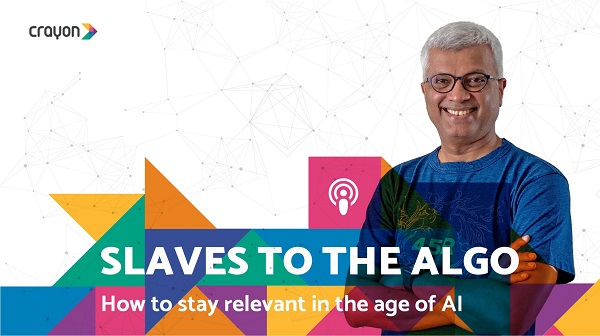Give us a short introduction about you.
I am the CEO of Crimson Marketing, an author, a speaker, and an advisory board member. I am also the podcast host for money ball for marketing.

I have been a marketing professional for over 25 years and have helped companies across all aspects of marketing. In the last two years, the world of marketing has radically changed. Therefore, we are now focusing on improving marketing performance – and that is all about how you measure what you are doing in 3 areas: digital marketing, demand generation, and marketing technology.
Can you be specific about the term “Marketing Technology”? How is marketing technology related to big data?
Marketers are forced to make sense of big data. That’s not been true in the past. In the last three years, the landscape has shifted. There used to be 200 companies that call themselves as marketing technology companies. Now there are over 2000 companies that call themselves as marketing technology companies, and these companies have been created specifically to help marketers with the challenge of big data. There are 43 different categories of Software vendors that call themselves as marketing tech vendors. Marketers need the right set of software in-order to effectively accomplish their goals. At Crimson marketing, we assess how well providers’ technical capabilities meet marketing’s needs, and help them to integrate the systems, and monitor their performance.
Do you use any specific tools or tech to achieve a company’s marketing objective?
We are vendor neutral; we use whatever technologies a company has in place – we will help them use the technology they have. So a typical company can have anywhere from six to eighty marketing technologies in their marketing tech stack. We make sense of the whole marketing tech.
How can marketers generate insights from lot of multiple data sources? Do they need help from data science team? Or do you recommend that they should know specific skill sets?
A marketer doesn’t have to be a data scientist. However, they need to work with their IT and business intelligence (BI) teams to ensure that the systems are designed in a way that marketing can get value out of them. So marketers are the end user. The IT and BI teams will design or integrate the systems. We play a liaison role between marketing and IT because those two teams don’t speak the same language.
So you help marketers communicate with IT and BI teams. Since marketers don’t understand tech terminologies like Python, R and Hadoop, how do you explain it to them and what difficulties do you face while interacting with marketers?
The trick is we don’t make them understand. We will never bring in Hadoop in the conversation with the marketer.
What we will say to them is: Don’t worry about how big the data set is, don’t worry about the fact that you need the real time analytics. Let tech take care of that. Your job as a marketer is how to say “this is what I want to accomplish with the data”. Let us work with the IT and BI teams to design the systems to accomplish that marketing goal. I think it would be a mistake to get marketers involved in understanding that level of technology. They do need to understand the application layer. However, they need to understand how to follow the digital footprint of a buyer, how to track information about their current customers. Those are done at the application layer. We want to hide the infrastructure layer from them.
In one of your presentations, you talked about social selling. What exactly is social selling? How does it make a real impact on revenue?
Think of it this way, there are enormous amounts of information available to marketing and sales teams. There are lot of different systems(website, CRM, etc) that can collect that information and make sales rep more knowledgeable. However, it is upto the marketing team to package that information in a way that makes it easy for the sales rep to communicate. And so, marketing should listen through social listening tools and deliver just the information that is particularly relevant to the sales rep. For e.g., if the sales rep is selling to one very large bank, they will need to know everything that is happening about the bank in the social world. But if they do understand that, then they can communicate highly relevant information with people they are trying to communicate.
Can you please talk about some particular categories of tools that we think are important for companies to consider?
One very important category is “prospecting customer data collection through the digital pathway that an individual buyer is taking”. There are companies like tealium, which specialize in gathering many data points about someone who is coming to your website. So that you can provide a unique personalized experience for the website visitor. Their specialty is in the data collection.
Whereas, there are other companies that provide the content. I will give you an example of another company called Get Smart content. They specialize in understanding what content needs to be served. This is based on a lot of factors including behaviour of website visitors. Thus, they can ensure that the next piece of information customers get is exactly what they are looking for. For e.g., somebody might come to your website once and look at a web page but not download anything. The next time they come to the website, we provide them with relevant content on the home page. We know what is relevant because we have a lot of information about that visitor. In this way, we make their life easy and give customers exactly what they are looking for.
There is another category, called predictive analytics. Predictive analytics helps companies understand the profile of a perfect customer based on Machine learning algorithms, so companies can target new customers that match the profile of their perfect customer.
In one of your talks, you said that organizations need to analyze external and internal data to understand their customer needs. But how can startups do that (they don’t have enough internal data)?
In this case, they can use only external data. To access external data effectively, they can use predictive analytics. Mintigo is an excellent predictive analytics software. Mintigo has access to millions or billions of data points that are publically available — information about what companies and individuals are doing. And once startups have that information, they can predict what their target customer needs. I will give you an example. Let’s say you are selling a technical software. Predictive analytics can tell you what kind of software a company is using on their website and what type of people the company is hiring right now. Just with this information, you will understand that the enterprise’s environment fits your product, because they are looking to hire people who can solve the very problem that your product solves.
Why did you name your book as “Money ball for marketing”? I love the name! Who is going to be the Billy Bean and the young kid in an organization—the ones who are going to transform the organization using the power of data?
In this case, the Billy Bean is the CMO but the data analyst is somebody on their team, or someone like us, who works with data and technology. The CMO needs to say, “Hey, I need to measure things differently, and I need to look for the areas in marketing where I can make improvements. But, I need data and technology to do that.”
How did you come to found Crimson Marketing?
We help marketers measure their performance. Let me put it this way, there is whole other aspect of big data you and I haven’t even spoken about. Every CMO is under pressure to measure the impact of what marketing is doing and to show how they are contributing to the company’s revenue. So CMOs need to understand everything that is working and not working inside marketing. So that they can make improvements in the area where it is not working. And that’s where they ask for our help. Like, how do we measure what we are doing and then we help them to identify where they can make improvements, and then we step in and we actually make those improvements.
Any words of wisdom for aspiring marketing technologists?
The first thing they need to understand is to start with the marketing strategy before they think about the technology. Then they need to look at the people and the processes inside the company to understand the maturity of the company. Then, and only then, should they get into the data and technology aspect of it.

How To Create A Killer Email Sequence To Drive Conversion
Email...















